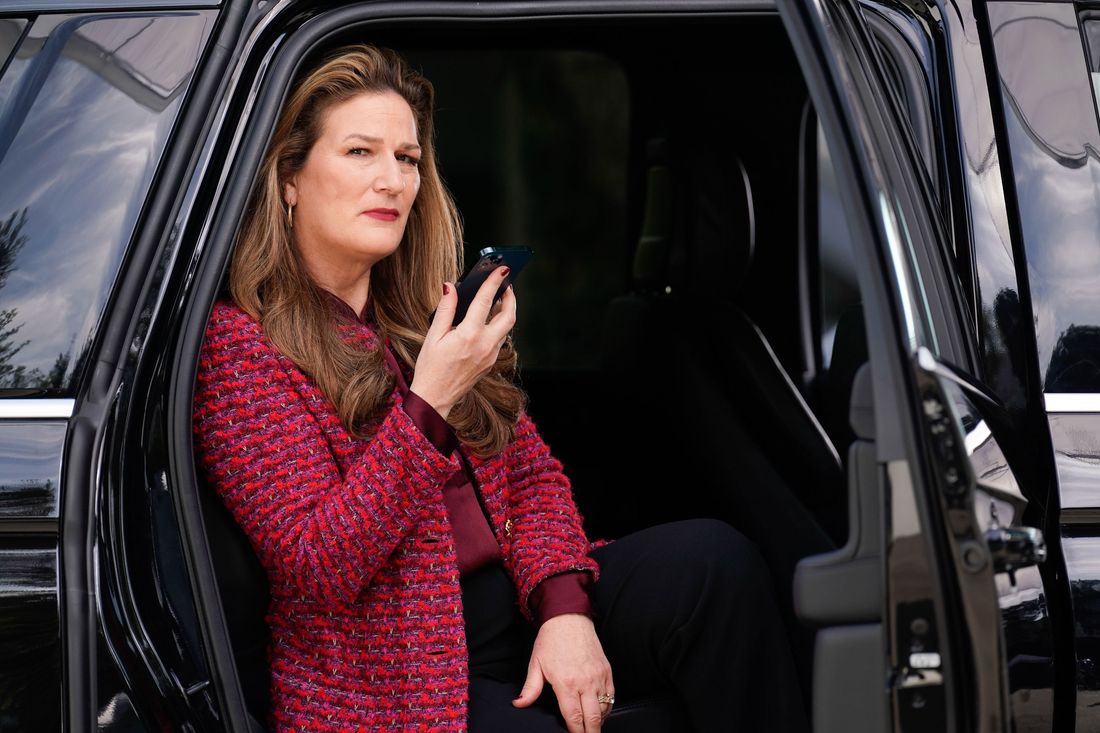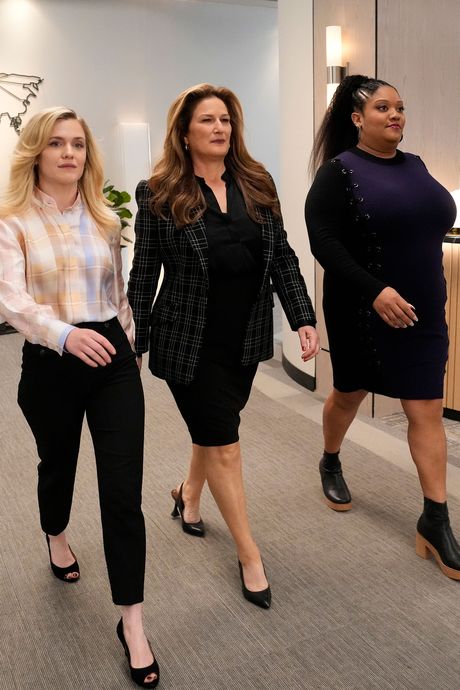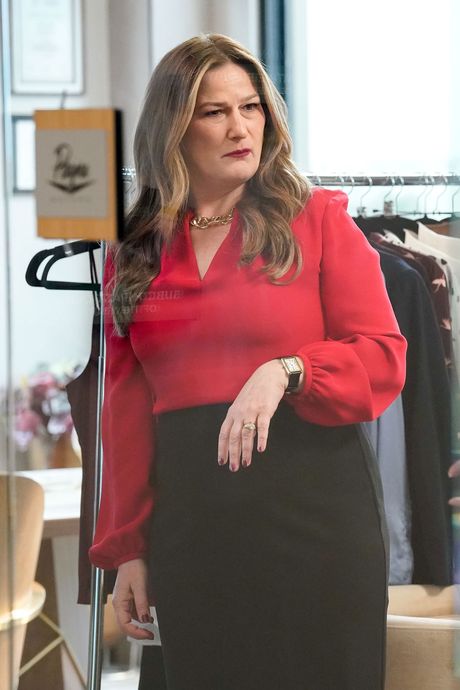
“We’re actually going to break bread together,” Ana Gasteyer observes a few minutes into our tableside chat. “Isn’t that nice?” We’re surrounded by the finest boule bread and French fries this lower Manhattan hotel has to offer — a bountiful setting of highbrow and lowbrow, she jokes, to “analyze her career.” And what a time to do some analysis. Gasteyer is well into her second season of American Auto, the whip-smart NBC workplace sitcom that’s more interested in skewering the despicable people who get cars on the road than the cars themselves. She portrays Katherine Hastings, the new CEO of a motor company that’s plagued with low stock prices, low morale, and a high volume of public-relations fiascoes. (One of the company’s cars starts a large-scale, rather biblical wildfire.)
But we’re not watching American Auto for sedan mischief. It’s one of the few shows — if not the only show, Gasteyer argues — that ambitiously reflects just how uncomfortable society has become and just how much the C-suite is to blame. Episodes about abortion and the perils of political correctness are dissected with as much care as, say, the bullshittery of green technology. “I don’t want to be hyperbolic,” she tells me, “but I don’t think other comedies are doing this right now.” American Auto has also given Gasteyer, a venerable SNL alum, the first top-billed show of her career at the age of 55. “It’s the perfect situation,” she explains. “I feel really seen, taken care of, and written to. Sometimes it happens when it’s supposed to.”
You strike me as someone who should’ve been the lead on a network sitcom years ago. What took so long?
I took a road less traveled. I loved SNL, but so much of it for me was a blitzkrieg of creativity and anxiety and fame. The whole situation is explosive. The adrenal experience left me feeling a little depleted. The way I saw things by the time I left was, The best I can do is not fail every Saturday, as opposed to, You’re always pulling it off on that show. Why are you even thinking, “Oh my God, I hope I pull it off?” If you didn’t fuck up, you won. I was really attracted to theater in part because there’s so much discipline, perfection, and rigor to it. You get to do the same thing over and over and over again and make it better each week.
It was like an overcorrection.
It was very secure and safe. Also, remember, I left the show in 2002. Opportunities for females weren’t the same as they are now. Tina created 30 Rock five years after, and that was a new breakthrough. I guess you could point to roles on television, but it wasn’t the same. You weren’t going to march into a fantastic female protagonist out of SNL in 2002. But there were lots and lots of opportunities on stage. I was a trained singer and wanted to use my training. I wanted to improve. I wanted to try something different. It’s funny: When you do a ton of theater, you get to this point where you’re like, I miss the funny people. It wasn’t until I went back for the Betty White show at SNL that I connected deeply with my female colleagues again. That started to tell a story of how many of us there were. When I started, there were only three of us on the show.
Even in a six-year span, the way women were used on the show changed radically. We brought a lot to the table. Molly Shannon and Cheri Oteri were hustlers. We had three female writers, including Paula Pell, and three female cast members. Everybody else was a straight white guy. There were some really nice straight white guys, but we had to work hard to stake our territory. The theater thing came, and then half-hour comedies eventually seemed like the happiest of the mediums: It’s fast. You get to refine a character over time. It’s not obnoxiously boring.
Were you auditioning for a lot of roles?
I tested for Julie Bowen’s part in Modern Family. There were a lot of wives. A lot of wives. There were things I got close on that were like, Oh, shit, that would’ve been nice.
How much did the Michael Scott–ification of sitcom bosses affect how you wanted to portray and calibrate Katherine? It’s become sort of an inescapable comparison, but the connection is closer here since Justin Spitzer wrote on The Office.
You always have a challenge with a female lead to make sure she’s likable or empathetic in some way. A pure cold-hearted bitch is a fun side character, but not a great lead.
Why do you think that is?
The way people perceive women in power is still complicated in our culture, so certain kinds of women and female characteristics are frightening. The idea of She Boss and this kind of swaggery mega-bitch wasn’t that interesting to me. It wasn’t something that would have room for compromise and gray areas, and that’s where comedy comes from.
The character may exist one way on paper in the first season, but eventually you have to change things. I didn’t write the character, but there are things you push against as a performer, and there are things you can comfortably inhabit. I’m a natural ensemble player. I’m a natural collaborator. I’m a natural leader. I like to be a part of a team. So when Justin recalibrated the dynamic in our workplace from “Everyone’s afraid of getting fired by Katherine” to “Katherine put her neck on the line for everyone’s job even though she’s super-selfish, and she constantly reminds people of her sacrifice and wants credit for it,” it became an us-against-them dynamic as opposed to she-against-they.
It’s complicated. The comedy comes from ridiculous situations, but it’s the better-intended and more fallible ones that take you back to Michael Scott. If your intentions are right, especially as a female character, and your heart is sort of in the right place, you get a lot more mileage from your character. It’s fun to have enormous confidence around the ways in which you’re an asshole. But also, those vulnerabilities make for a good story.
I like the idea of having confidence around vulnerabilities.
We talked about that a lot around the aging episode, for example. We wrote in the line, “You’re a woman in this business; you’ve got to look a certain way, and you’ve got to keep up a certain kind of appearance.” It’s not an option to not play by the rules in this culture. Continuing to have a business conversation while getting Botox shot into your eyebrow, but having no problem with the fact that this insanely vulnerable thing is happening — that, to me, is very funny.
What about something like the appearance of success?
That’s very important to her. She’s very aware of how things look. The head of our hair department takes Katherine’s hair incredibly seriously. Every frame of every episode, my hair is fucking perfect. Katherine looks deeply in control. Women at that level have to be very groomed and put together, even if they’re not in control at all.
Did you have to push against much else?
I didn’t want to soften her so much in a network-y way that we lost what was arrogant and fun about her. You can have a likably arrogant human, you know? CEOs, showrunners, producers, and directors think very highly of themselves. I love the idea that Katherine is shameless in her assessments and insults and expectations of people. She’s exacting. It should stay that way.
What does Justin understand about a workplace comedy that others fail to?
He’s not cautious. He’s a fantastic observer of how a little workplace pond gets one ripple and it impacts everybody in a million ways. He’s got a Norman Lear–style insight into American society. He’s incredibly good at bringing up very uncomfortable topics, seeing all sides of them, and finding what’s funny about them. Look at “Commercial” from last season. It was about making a politically correct commercial, and everything goes south so fast. It starts by tweeting a rainbow square in solidarity with a lesbian couple who gets kicked out of a roller rink, and the last frame of the episode is literally just an empty swing set with a car — the most dystopian, depressing possible outcome for a commercial. And then “The Letter” from this season about abortion. Did you see the whiteboards?
They’re an incredible third layer of jokes.
One of the gratis products was three-day passes to Six Flags — the idea of women going there after their abortions. American Auto is about corporate America being really bad at being good. They’re trying really hard. Americans are bad at being good. The intentions are there, but the stock price matters to them more than their morals. But the morals are there. It’s not like they’re total assholes. They’re just partial assholes. My favorite kind of writing is about flawed people.
Where does Katherine fit into the Venn diagram of good and bad?
She’s partially ego-driven. Narcissism gets in the way sometimes. I also think really good CEOs are narcissists. They’re good at moving on. They don’t spend a lot of time hand-wringing and wondering. Good directors are like that, too.


I’m curious how the show’s setting, being an historically male-dominated industry, influenced how you wanted to portray Katherine.
I read every biography on Mary Barra. I deeply admire her. She’s nothing like Katherine; she’s born and bred from cars, understands it inherently. The auto industry is a venerated and old American industry, which is why Justin chose it. It’s a massive political organism, and it’s enormously male — a dinosaur in many ways. But it’s also the best of American ingenuity and American inventiveness. It has a really cool through-line to the future. You can talk about electric vehicles, you can talk about the supply-chain issues — I never thought the business could tell so many stories. The problem is some people think our show is about cars. People on Twitter are like, “They would never design a V8 engine.” It’s a workplace comedy. Have you watched Cheers? The way they ran that bar is not normal.
American Auto, at least to me, seems like one of the only sitcoms airing at the moment that really dives into the most unpleasant aspects of American society.
I think we’re the only show on television that’s diving in at this awkward level at this awkward moment in time. We’re at the most divisive moment in American history, certainly in this century, and we’re making a TV show about it. Our cast is incredibly diverse without tokenizing in any way — I don’t spend a whole lot of time talking about being a female CEO, and the Black cast members don’t spend a lot of time having to represent the views of all Black people. I would like three or four more seasons to be having those conversations. I can imagine someone like Katherine running for office or supporting the wrong candidate or wanting to write a book. I also think there’s fun stuff to do with her screwing up at women-in-leadership conferences. I’m very proud to be a part of something that’s talking about uncomfortable things. Sometimes it makes me uncomfortable.
It’s funny, because Quinta Brunson has said to me and to Justin, “Your show is the only show that can do what it’s doing,” because you can punch up. We’re dealing with corporate assholes; you can make fun of how we’re rich assholes. We can do the wrong things in a noticeable way. We can fuck stuff up. That’s the point of our show.
What are the wrong things?
You can’t punch down, and you can’t make fun of people who are having a hard time. It’s not fair. This show calls it to account. That’s a gift I got from SNL. You just fucking lean in. Getting precious about stuff … sometimes the joke is just the surprise. Sometimes the joke is the reaction.
You talk about how generous of a showrunner Justin is. Is there room for spontaneity?
He writes like the Curb guys. We have so many lines per episode. It’s only 21 minutes. There’s not a lot of room for error. There’s so much story happening, and he still manages to use so many improvised lines. I’m shocked every week. They’ve worked hard to make it what they want, and then some asshole actor comes along with their improv? There’s a chance it can blow the joke or miss the thread, but we have a lot of really good improvisers on our show. He’s shockingly generous about it. I’ll watch the show because I’ll be like, Oh, I said a funny thing there, and I wonder if they used it.
I’m surprised you never returned to host SNL. It seems like a sure thing.
That would be amazing. You can give Lorne a call. I would love to host.
I want our show to hit a note with people and be in the Zeitgeist — and for people to figure out that it’s on fucking television. There’s a migration from Hulu to Peacock, and people are getting confused. There’s just so much content.
Do you think American Auto could’ve worked on a premium cable network like HBO?
Yes. In fact, I think it’s a cable show on network television. It’s amazing what NBC is letting us do. It’s fast-paced, it’s intelligent, it’s not patronizing, and it’s not talking down to its audience. It’s also written in a way that would flow better without commercials, although I can’t say that out loud because my husband works in advertising. I wish people would give as much credit to NBC for letting scripts like the abortion and commercial episodes go through. They’re tough for a network audience. They’re answering to red, white, and blue America, and they get nervous. But they’ve been incredible.
Did any scripts make NBC a little too nervous?
They were very nervous about the abortion one. Justin said, “Let’s see it through. Let’s hear it.” It was an incredibly funny table read, and they let it happen.
Listen, I’ve been waiting my whole career to be on an NBC comedy. I’m fucking psyched. There’s something nice about having a big boy behind you like that.
NBC is the big boy?
They’ve been at it a long time. I was at that 40th-anniversary party for SNL. The stable of talent in that building and under that stupid Peacock icon is extraordinary. To be a part of that is exciting for me. But I know it’s also old-fashioned. I walked through the Rockefeller Plaza lobby today. It feels like you’re in a movie about an actress who’s in New York doing a TV show.
Do you think you could’ve played this role ten years ago?
Probably not. It’s corny, but everything does happen when it’s supposed to. I’ve produced a lot of things for myself. I produced my own album. I wrote and produced my Christmas movie with Rachel Dratch. I’ve had my one-woman show on the road for a long time. They seem like small things, but they’re hard when you’re pushing your own little boulder up the hill. I have a lot more confidence in what I can bring to something from a leadership standpoint.
Being No. 1 on the call sheet is a responsibility. It’s a big one. I don’t know how much anyone else takes it seriously, but it matters to me that I set a good example, I know my stuff, I’m a good colleague, and I’m a good leader. You’re there from 5 a.m. on Monday until midnight on Friday, you’re in almost every scene, and you have a responsibility to be professional and fun. I don’t think I would’ve known how to do that necessarily, or I would’ve felt too much pressure. I love it now. I have fun doing it. There’s something nice about getting it when you want it. I’m very aware of what a lucky break it is. It’s hard to get a network-television show.
Have you ever pitched a network comedy yourself, like Tina did for 30 Rock?
Once, long ago. I have a character that I’ve been developing forever. One day I’ll do something with her and she’ll exist. It’s like The Comeback, but for a Broadway lady. I’ve written whole musical numbers and recorded songs for her. We soft-pedaled the network version of that.


